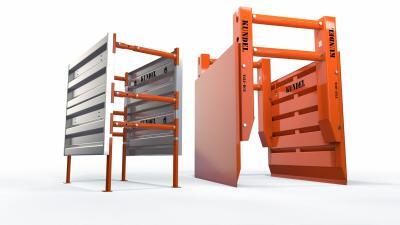Excavators are powerful and versatile machines that are used in a variety of industries, including construction, mining, and forestry. These machines can perform a wide range of tasks, from digging trenches and foundations to clearing land and removing debris. However, the power and complexity of excavators also make them potentially dangerous, especially when operated improperly or without proper safety precautions. In this blog post, we will discuss some important tips for excavator safety.

Trench Safety Equipment: Trench Boxes Manhole Boxes, Bedding Boxes, Road Plates
- Ensure Proper Training and Certification
Operating an excavator requires specialized knowledge and training. It is important to ensure that anyone who operates an excavator is properly trained. Certification in both operation and safety may also be considered. This will help prevent accidents and ensure that the machine is used safely and efficiently.
- Conduct Regular Inspections and Maintenance
Regular inspections and maintenance are critical for excavator safety. Inspections should be conducted before each use to ensure that all components are working properly and that there are no signs of wear or damage. Any issues should be addressed immediately before using the machine.
- Use Proper PPE
Personal Protective Equipment (PPE) is an important part of excavator safety. Operators should wear the appropriate PPE, including hard hats, eye protection, and steel-toed boots. PPE can help protect against falling debris, flying objects, and other hazards.
- Clear the Work Area
Before operating an excavator, it is important to clear the work area of any potential hazards, such as debris, people, or power lines. Operators should also be aware of any underground utilities, such as gas lines or electrical cables, and take appropriate precautions to avoid damaging them.
- Follow Safe Operating Procedures
Safe operating procedures are essential for excavator safety. Operators should follow the manufacturer’s instructions and any applicable regulations and guidelines. They should also be aware of the machine’s limitations and avoid overloading or overworking it.
- Maintain Communication
Communication is important when operating an excavator, especially in busy or crowded work areas. Operators should maintain clear communication with any workers on the ground and follow established hand signals or other communication protocols.
- Be Prepared for Emergencies
Even with proper precautions, accidents can still happen. Operators should be prepared for emergencies and have a plan in place for responding to accidents or injuries. This should include having a first aid kit and emergency contact information readily available.
In conclusion, excavator safety is critical for preventing accidents and ensuring that these powerful machines are used safely and efficiently. By following these important tips and taking proper precautions, operators can help prevent accidents and create a safer work environment for everyone.






